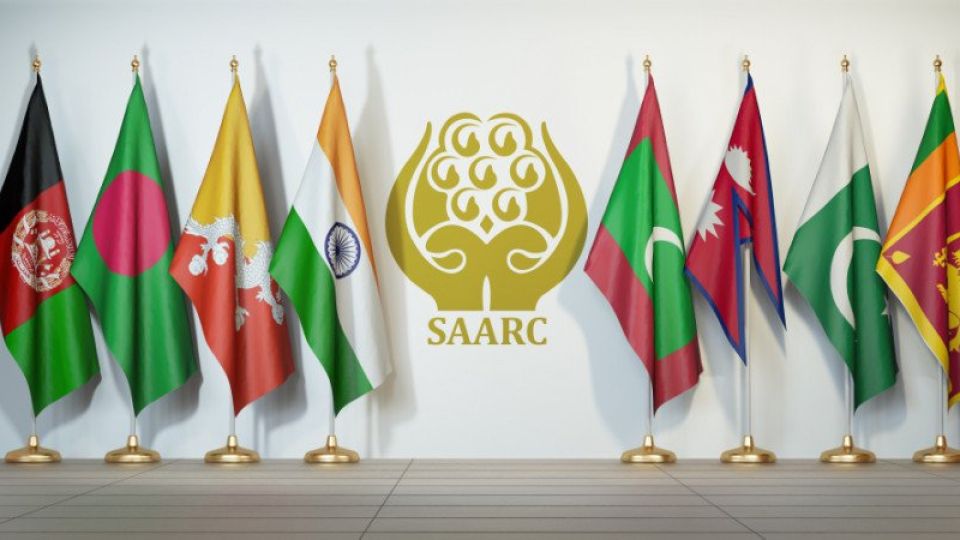December 12, 2022
KATHMANDU – On Thursday, the South Asian Association for Regional Cooperation (Saarc) became 38 years old. After 2016, following yet another India-Pakistan dispute, the body has failed to hold regular summits, ministerial meetings, meetings of senior officials and other multilateral engagements.
Saarc was established on 8 December 1985 with the goal of promoting the welfare of South Asians; improving their quality of life; accelerating economic growth, social progress and cultural development; providing all individuals the opportunity to live in dignity and realise their full potential; and promoting and strengthening collective self-reliance.
Minister-level meetings between member states have ceased after the Taliban seized power in Afghanistan in August 2021. The meeting of the programming committee at the joint secretary level, which is considered vital to keep alive the Saarc process, has also failed to convene in the last two years.
Nepal could not host the meeting of Saarc Council of Ministers’ in New York on the sidelines of the United Nations General Assembly as Foreign Minister Narayan Khadka did not travel there and there was also a confusion on whether the new regime in Afghanistan should be invited.
Officials told the Post that even regular commemoration of the Saarc Charter Day at the Saarc Secretariat in Kathmandu did not happen on Thursday, which otherwise used to be a regular yearly affair. Due to the Covid-19 pandemic over the past two years, the Secretariat had stopped the commemoration of the Saarc Charter Day. Officials said they were taken by surprise that the event wasn’t taking place even this year, adding that they could find no convincing reason why it was not happening this time.
After failing to convene the ministerial level meetings that oversee the meetings of the programming committee and the senior officials’ meeting, the budget of the Saarc Secretariat is now being released on an ad-hoc basis, said the officials.
Before every New Year, the programming committee would meet and decide the annual budget of the Saarc secretariat and its related activities, said Arjun Bahadur Thapa, a former Saarc secretary.
Member states have been releasing budgets through circulars for the running of the Saarc secretariat and some institutions that work under the Saarc ambit, said two officials familiar with the developments. “Unless there is some realisation and understanding among the member states, the Saarc process won’t move ahead for sure,” said one of the officials.
Despite its sluggishness and almost zero progress in carrying forward its activities, regional leaders have not stopped promising the revitalisation of the Saarc process.
Prime Minister Sher Bahadur Deuba in his message on the 38th Saarc Charter Day on Thursday emphasised the need “intensify our collective endeavours for the sake of our peoples and societies and work together to revive the Saarc process”.
“As the Chair of Saarc, Nepal is fully committed to doing its part to revive the Saarc process and make it more vibrant, effective, and result-oriented,” Deuba said in a statement. Nepal has become the longest-serving chair of the Saarc in its 38-year history.
Due to a longstanding rivalry between India and Pakistan, the Saarc process has been stalled since 2016 after India refused to participate in the 19th Saarc Summit that was supposed to take place in Pakistan. The summit was cancelled after an attack on an Indian army camp in Kashmir. India blamed Pakistan for the attack and decided to pull out from the meeting, a decision that was backed by the majority of member states. Then the crisis in Afghanistan following the takeover by Taliban last year further complicated the Saarc process; seven other member states are yet to recognise the new regime in Kabul.
“Regional cooperation remains an important factor in our collective human welfare with peace and security being a prerequisite to realise this [Saarc] objective,” Indian Prime Minister Narendra Modi said in his message on Thursday. “Let us all come together and re-dedicate ourselves to realise the shared vision for a peaceful and prosperous South Asia.”
In his message, Pakistani Prime Minister Muhammad Shehbaz Sharif said Pakistan continued to hope that the obstacles in the way of holding the next Saarc Summit would be soon removed, enabling the Saarc to function as an effective instrument of regional cooperation.
The Saarc Secretariat in Kathmandu released the messages of seven heads of state and governments on the occasion of Saarc Charter Day, but not from Afghanistan.
The regional bloc is facing another dilemma over the post of next secretary general, a Nepali official said. It is the unrecognised Afghan government’s turn to recommend the next secretary general. The incumbent Saarc Secretary General, Esala Ruwan Weerakoon of Sri Lanka, is due to complete his term in March 2023 and before he retires, member states have to reach an understanding on the appointment of his replacement.
“The Saarc Secretariat has already informed member states that Weerakoon is going to leave in March and has held several rounds of consultations, but we are yet to reach any understanding,” a Nepali official privy to the developments said.
At some point, officials suggested either giving another term extension to the incumbent Weerakoon until a new secretary general gets appointed or jumping to Bangladesh, requesting it to recommend the next secretary general, said the official. The Saarc summit and the appointment of secretary general takes place by the English alphabetic order.
“Saarc has become increasingly ineffective,” Thapa said, “It’s in a state of coma: neither dead nor fully alive.”


